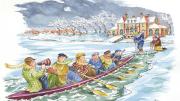1926
Thick ice on the Charles River has lasted a month longer than usual, forcing the crew coach to hire men to cut a channel from Newell Boathouse to areas of the river with more open water.
1936
The article “Electing Overseers Fifty Years Ago” reports that alumni in 1886 were informed not only of candidates’ qualifications but also of their opinions on controversial Harvard issues: should attendance at morning prayers be made voluntary? should knowledge of Greek be required for admission to the College? should women be allowed in the professional schools? should the marking system be abolished in College courses?
1941
The first Crimson to appear after spring recess decries the prejudice that led the U.S. Naval Academy to forbid Lucien V. Alexis Jr. ’42, a black member of the Harvard lacrosse team, from playing in the game held there during the break.
1961
Radcliffe women are included in the Harvard Who’s Who directory, lengthening the student section by some 35 pages.
1971
The peer-counseling group Room 13, operating from 8 p.m. to 8 a.m. every night, has been founded as a way for students to talk anonymously to a sympathetic listener or get information on sensitive topics like birth control and drug use. The founders credit their motto to the Beatles: “We get by with a little help from our friends.”
1981
The student-faculty committee formed in response to student demands for a Third World Center unanimously recommends instead the establishment of a foundation to improve racial relations on campus. Rather than encourage “further separation of the races,” the committee seeks an organization that does for race and ethnicity what Phillips Brooks House does for charity and service.
1996
The Harvard women’s basketball team (20-7 overall, 13-1 Ivy) reaches the NCAA tournament playoffs for the first time in history. (The men’s team hadn’t made it since 1946.) Despite losing 100-83 to number-three seed Vanderbilt, number-14 seed Harvard twice draws within five points of its rival in the game’s final minutes.









